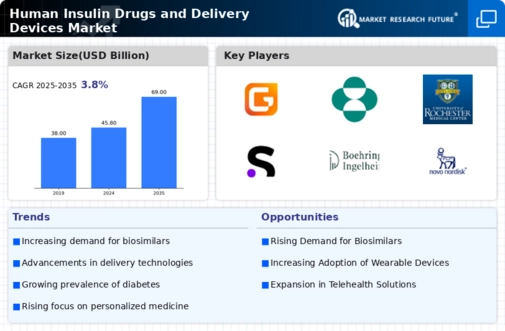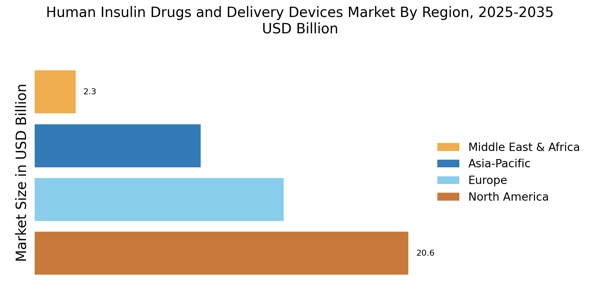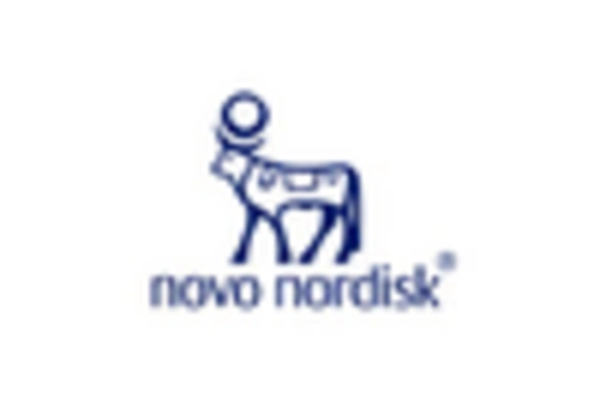Rising Prevalence of Diabetes
The increasing incidence of diabetes worldwide is a primary driver for the Human Insulin Drugs and Delivery Devices Market. According to recent statistics, the number of individuals diagnosed with diabetes has surged, with estimates suggesting that over 500 million people are currently living with the condition. This growing patient population necessitates a corresponding rise in insulin therapies and delivery devices, as effective management of diabetes is crucial for preventing complications. The demand for human insulin drugs is expected to escalate, leading to innovations in delivery devices that enhance patient compliance and treatment outcomes. As healthcare systems adapt to this rising burden, investments in research and development for more effective insulin formulations and user-friendly delivery mechanisms are likely to increase, further propelling the market forward.
Government Initiatives and Support
Government initiatives aimed at combating diabetes are playing a crucial role in shaping the Human Insulin Drugs and Delivery Devices Market. Various countries have implemented policies to promote diabetes awareness, prevention, and management, which include funding for research and development of new insulin therapies and delivery devices. For instance, public health campaigns and subsidized healthcare programs are designed to improve access to essential medications and technologies for diabetes management. This support not only enhances patient access to human insulin drugs but also encourages manufacturers to invest in the development of innovative delivery solutions. As governments continue to prioritize diabetes care, the market is likely to experience sustained growth driven by these supportive measures.
Increased Focus on Diabetes Management
The heightened focus on effective diabetes management is driving growth in the Human Insulin Drugs and Delivery Devices Market. Healthcare providers are increasingly recognizing the importance of comprehensive diabetes care, which encompasses not only medication but also lifestyle modifications and patient education. This holistic approach is leading to a surge in demand for insulin therapies and advanced delivery devices that support better management of the condition. Market data suggests that the global expenditure on diabetes care is projected to reach trillions of dollars in the coming years, reflecting the urgent need for effective solutions. As healthcare systems strive to improve patient outcomes and reduce the burden of diabetes-related complications, investments in innovative insulin drugs and delivery technologies are likely to increase, further propelling market growth.
Growing Demand for Personalized Medicine
The shift towards personalized medicine is emerging as a significant driver in the Human Insulin Drugs and Delivery Devices Market. Patients are increasingly seeking tailored treatment options that consider their unique metabolic profiles and lifestyle factors. This trend is prompting pharmaceutical companies to develop more individualized insulin therapies that cater to specific patient needs. Market Research Future indicates that personalized insulin regimens can lead to improved glycemic control and patient satisfaction. Additionally, advancements in genomics and biotechnology are facilitating the creation of customized delivery devices that align with patients' preferences and requirements. As the demand for personalized healthcare solutions continues to rise, the market for human insulin drugs and delivery devices is expected to expand accordingly.
Technological Innovations in Drug Delivery
Technological advancements in drug delivery systems are significantly influencing the Human Insulin Drugs and Delivery Devices Market. Innovations such as smart insulin pens, continuous glucose monitoring systems, and insulin pumps are transforming how patients manage their diabetes. These devices not only improve the accuracy of insulin delivery but also enhance patient convenience and adherence to treatment regimens. The integration of digital health technologies, including mobile applications that track glucose levels and insulin usage, is also gaining traction. Market data indicates that the adoption of these advanced delivery systems is expected to grow, with projections suggesting a compound annual growth rate of over 10% in the coming years. This trend underscores the importance of continuous innovation in meeting the evolving needs of diabetes patients.

















